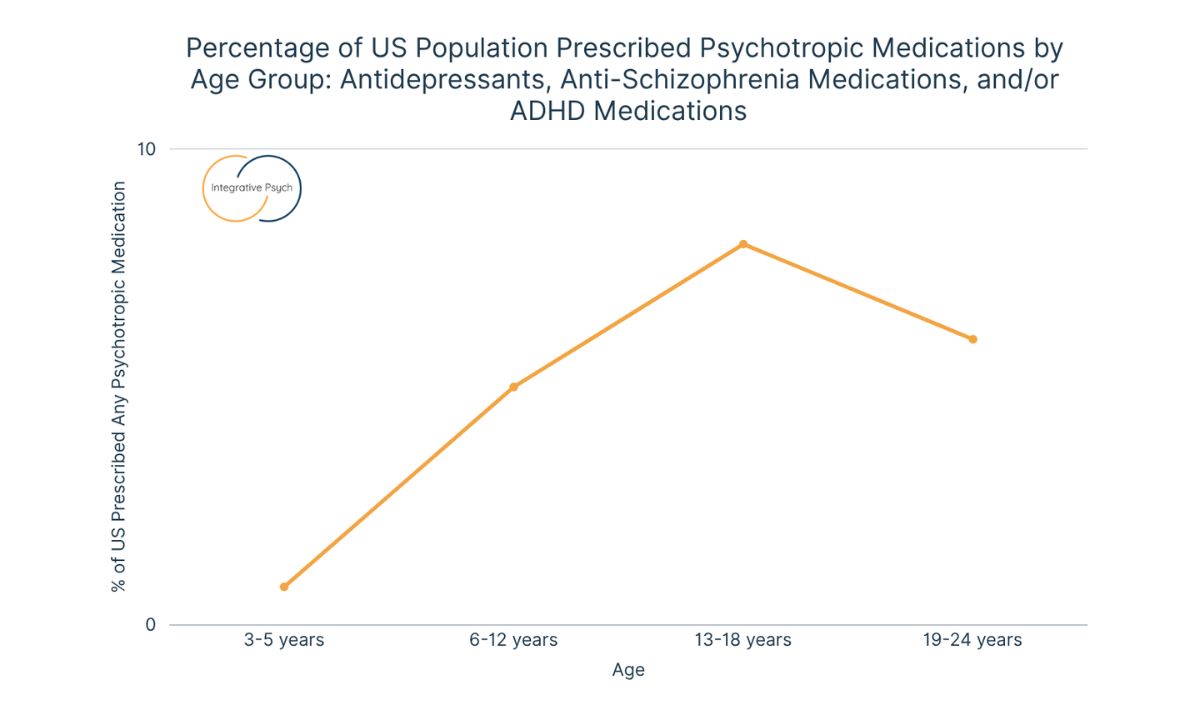
New York, NY – July 16, 2025 – Qwoted Newswire – In a peer-reviewed study that was published in the Journal of Child and Adolescent Psychopharmacology, Columbia University psychiatrist and Assistant Professor Dr. Ryan Sultan analyzed over 6 million prescription records for young Americans, highlighting discrepancies in psychiatric medication prescribing trends (aged 3-24). The study found that while many common psychiatric conditions among children (ex., ADHD, depression) went untreated, some – particularly very young children – were being prescribed powerful antipsychotic drugs for unclear or off-label reasons.
“Our results show that, at a population level, children and adolescents are not being medicated at rates higher than the prevalence of the conditions these drugs are meant to treat,” said Dr. Sultan, founder of Integrative Psychiatry and lead author of the study, “These findings are inconsistent with the perception that young people are being over-medicated and should provide some reassurance to parents and professionals concerned about that issue.” Dr. Sultan is now repeating the study using the most recent national prescribing data and updated analytical tools to confirm that these gaps have persisted.
The data shows that stimulant (used for ADHD) and antidepressant (used for anxiety and depression) usage mirrors or is below the epidemiologic rates – countering widespread concerns of rampant overmedication. For example, while 1 in 12 U.S youth were diagnosed with ADHD in the study year, only about 1 in 20 youth received stimulant prescriptions. Likewise, approximately 1 in 8 teenagers experienced a major depressive episode annually, but fewer than 1 in 30 were prescribed an antidepressant in that same period.
However, antipsychotic prescribing trends diverged. Antipsychotics – intended for severe psychiatric conditions – were prescribed to about 1% of adolescents at their peak usage (and less in younger children). These patterns did not neatly correspond to specific diagnoses because antipsychotics were often used for a variety of off-label behavioral issues. Some children, especially in preschool or elementary years, may be receiving these powerful medications without a clear clinical rationale. The study notes that antipsychotic prescriptions in youth “may reflect the heterogeneity of the approved and off-label conditions and disorders treated with this medication class.” “For young kids in particular, being on an antipsychotic raises a red flag,” said Dr. Sultan, “These medications can be lifesaving for disorders like pediatric schizophrenia, but if we see them used more broadly – outside of their intended scope – we need to ask why and ensure it’s truly necessary.”
The study also examined which medical professionals prescribed these medications. For children under 18, pediatricians wrote the majority of stimulant prescriptions (~43%) but a much smaller share of antidepressant (~13%) and antipsychotic (~11%) prescriptions. In contrast, most antidepressants and antipsychotics for youth, especially for teenagers, were prescribed by psychiatrists. Dr. Sultan noted that “Pediatricians may have a significantly higher comfort level diagnosing ADHD and prescribing stimulants than diagnosing depression or anxiety and prescribing antidepressants.”
“For many youth, the pediatrician is the only point of contact for mental health,” Dr. Sultan said. This imbalance in front-line care contributes to both under-treatment and potential over-treatment. “If pediatricians aren’t comfortable addressing depression or anxiety, those problems can be missed or brushed aside. Meanwhile, without adequate mental health support, there’s a risk of some children being put on medications like antipsychotics for behavior issues when therapy or other interventions might be better.”
In response to the findings in “National Patterns of Commonly Prescribed Psychotropic Medications to Young People,” Dr. Sultan suggests bolstering mental health resources within primary care and improving collaboration between pediatricians and mental health specialists. He points out that innovative models are already emerging to bridge this gap. “Improving access to child psychiatrists through consultation services and collaborative care models may help address potential undertreatment while also reducing the risk of prescribing medications before other treatments have been tried,” said Dr. Sultan. In practice, this could mean programs that allow pediatricians to quickly consult with a child psychiatrist about complex cases or co-manage care so that young patients access therapy or non-pharmacological support early on. Concerns about overprescribing should be balanced with awareness that many youth who would benefit from clinical treatment may not be receiving it.
Dr. Sultan hopes that the previous and new study findings will encourage healthcare leaders and policymakers to invest in primary care mental health training and resources, strengthening these resources so that no child falls through the cracks regarding their mental health. In doing so, Dr. Sultan argues, we can ensure children and adolescents receive the help they need – whether that’s counseling, environmental changes, or medication – appropriately and safely.
References
Sultan, R. S. (2017). Off-Label Prescribing of Antipsychotics for Youths: Who Should Be Treated? Psychiatric Times, 34(9), 26.
Sultan, R. S., Correll, C. U., Schoenbaum, M., King, M., Walkup, J. T., & Olfson, M. (2018). National Patterns of Commonly Prescribed Psychotropic Medications to Young People. Journal of Child and Adolescent Psychopharmacology, 28(3), 158-165. https://doi.org/10.1089/cap.2017.0077
About
Integrative Psychiatry is a New York-based mental health practice led by Dr. Ryan Sultan. The clinic offers comprehensive psychiatric and therapeutic services for children, adolescents, and adults using a holistic, evidence-based approach tailored to each individual’s needs. From ADHD, anxiety, and depression treatment to OCD, addiction, and trauma therapy, Integrative Psych’s multidisciplinary team provides personalized care to help clients achieve long-term well-being.
Integrative Psych – [email protected] – https://www.integrative-psych.org/
EditorHampton Zidlicky – [email protected]
Media Contact
Information contained on this page is provided by an independent third-party content provider. Binary News Network and this Site make no warranties or representations in connection therewith. If you are affiliated with this page and would like it removed please contact [email protected]



Comments